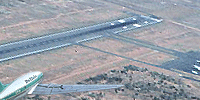 |
 |
|
||||
|
Marble Point is a rocky promontory on the coast of Victoria Land, Antarctica. The United States operates a station at the point. The outpost is used as a helicopter refueling station supporting scientific research in the nearby continental interior, such as the McMurdo Dry Valleys. Dependent upon the weather conditions at the time, helicopters are able to fly in and out of the station 24 hours a day during the summer research season. The station's remote location and adjoining frozen sea have largely discouraged tourism in the area. However, the Russian icebreaker Kapitan Khlebnikov conducts cruises in the Ross Sea and McMurdo Sound. In 1993, the icebreaker docked at fast ice offshore Marble Point. Tourists aboard helicopters launched from the icebreaker flew excursions into the McMurdo Dry Valleys.

Location of Marble Point Heliport in Antarctica By Alexrk2 | CC BY-SA 3.0. HistoryThe way station at Marble Point is located on a narrow strip of land between Wilson Piedmont Glacier and the sea, about 50 mi (80 km) from McMurdo Station. United States military forces built the camp on the western shores of McMurdo Sound in 1956 in conjunction with the forthcoming 1957–58 International Geophysical Year (IGY). 
Marble Point's relatively flat terrain facilitated construction in 1957 of a now-defunct dirt airstrip Preparation for IGY included constructing a hard-surface air strip at Marble Point. A VX-6 Otter airplane made Antarctica’s first wheels-on-dirt landing at Marble Point in 1957. Aboard were U.S. Navy Admiral Dufeck and New Zealand explorer Sir Edmund Hillary. A de Havilland Canada DHC-3 Otter aircraft crashed on take off at Marble Point, on January 04, 1959, taking the lives of two men. The plane was part of Operation Deep Freeze IV. Contemporary Marble Point is staffed during the austral summer by a station manager, cook, and a "fuelie," a person who fuels helicopters (typically AStar and Bell 212's contracted by the United States Antarctic Program and Antarctica New Zealand, owned and operated by Petroleum Helicopters International). Hot meals and minimal overnight accommodations for 14 are available for pilots and personnel traveling to and from inland research operations. Personnel rely upon melted snow for potable water. A bulldozer is used to scoop snow from nearby Wilson Piedmont Glacier. The snow is dumped into a hopper for melting and subsequent filtration. Other facilities at the station include an automated weather station. United States Antarctic Program workers conducted a concerted cleanup at the station during the 1989–1990 and 1990–1991 summer research seasons. Fuel spills are known to have occurred in the area. As late as 2001, spills more than 40 years old were still visible. Contemporary operations include the collection of human waste at the station, which is collected and transported to McMurdo Station.
Text from Wikipedia is available under the Creative Commons Attribution/Share-Alike License; additional terms may apply. The content above was published at Airports-Worldwide.com in 2023. |
||||||||||||||||||||||||||||||||||||||||||||||||||||||||||

 |
|
Copyright 2004-2025 © by Airports-Worldwide.com, Vyshenskoho st. 36, Lviv 79010, Ukraine Legal Disclaimer |